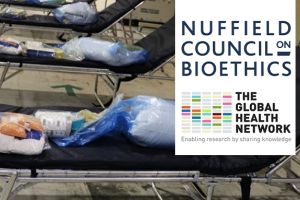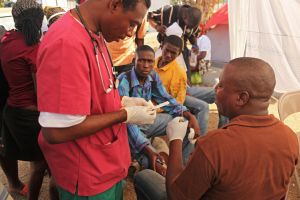News
Research in global health emergencies: our call for action
The Call for Action is as follows:
We want to maximise the contribution that scientifically robust, ethical research can make to improving the health of people affected by emergencies.
We are issuing a call for action to research funders, governments and others to:
- Ensure that research is not supported unless the basic health needs of research participants are being addressed through the response effort. Research funders will need to work in partnerships with humanitarian organisations and ministries of health to ensure this.
- Invest in putting community engagement mechanisms into emergency research to make them a reality. In the longer term, engagement must be a central part of local healthcare systems to ensure sustainability and preparedness.
- Promote fair and equitable collaborations between research organisations, particularly between external research institutions and their local partners in high- and low-income settings.
- Support emergency planning - including securing robust health and health research systems - given the vital importance of properly resourced preparedness between emergencies.
The Call for Action is supported by international research institutions and organisations including:
- International Rescue Committee
- The African Academy of Sciences
- Wellcome
- Médecins Sans Frontières UK
- London School of Hygiene & Tropical Medicine
- Elrha - a global humanitarian research charity
- Fundação Oswaldo Cruz (Fiocruz)
- Geneva Centre for Education and Research in Humanitarian Action
- University of Oxford, Medical Sciences Division
David Miliband, President and CEO of the International Rescue Committee, said:
“This report rightly points out that better evidence is needed to tackle global health emergencies. There is no excuse for ducking the challenges involved. And in our drive for this evidence, it is critical that we put the people and communities that we serve at the centre of our work.
The populations affected by global health emergencies deserve our best efforts to produce evidence that brings real change to their lives and to engage with them with equal respect and fairness. I look forward to the further boost that this report provides.”
Professor Nelson Torto, Executive Director of the African Academy of Sciences, said:
“This report is a timely reminder emphasising inclusivity, collaboration and ethical research processes that ensure the basic needs of communities, particularly during emergencies, are met. In Africa, absent or weak research regulations can leave communities vulnerable to exploitation. During an emergency, exploitation can also be easily elevated. That is why the African Academy of Sciences (AAS) supports this call to action to mobilize research stakeholders - governments, funders, researchers, communities, humanitarian agencies - to ensure the research process is humane and empathetic in as much as it endeavours to contribute valuable knowledge to respond to future emergencies.”
Professor Anne Mills, Deputy Director & Provost, London School of Hygiene & Tropical Medicine, said:
“The London School of Hygiene & Tropical Medicine is pleased to support this important report and Call for Action by the Nuffield Council on Bioethics, highlighting the essential role that ethically-conducted research plays in responding effectively to global health emergencies. The expertise of LSHTM staff, students, and international partners has made an important contribution to this work, in areas from strengthening research capacity in conflict zones to the embedding of community engagement in outbreak research. We look forward to working further with the Nuffield Council on these crucial issues.”
Jess Camburn, CEO of humanitarian research charity Elrha, said:
“As a leading funder of public health research and innovation in some of the most challenging humanitarian settings, Elrha fully supports this critical Call for Action. There is an urgent need for greater investment in research and innovation to support humanitarian and global health emergencies, but we know that such activity will engage with people and communities at times of extreme vulnerability. It’s therefore crucial that all funders champion the adoption of the highest possible ethical standards and approaches to safeguard vulnerable individuals, and advocate for fair and equitable collaborations. We applaud the Nuffield Council on Bioethics for spearheading this work.”
Dr Nisia Trindade Lima, President of Fundação Oswaldo Cruz (Fiocruz), Brazil, said:
“During the Zika outbreak, we faced many challenges to respond to that global health emergency. It highlighted the need to ensure procedures are ethically acceptable before, during and after global emergencies, including research ethics. It is crucial that funders, health authorities, researchers, health professionals, international organisations and society guarantee respect for the local community and respond to their most pressing needs. The impact on low and middle-income countries can be devastating if we do not conduct the global health response ethically, focusing on the communities’ needs, with their input. Fiocruz is ready to support this call for action aligned with its mission aimed in the reduction of social inequalities, and the defence of the right to health and full citizenship as central values."
Dr Kiran Jobanputra, Deputy Medical Director of Operational Centre Amsterdam and Head of the Manson Unit, Médecins Sans Frontières, said:
"It is essential that research in emergencies is conducted ethically in order to ensure it delivers benefits to the people and communities affected by war, disease outbreaks, environmental degradation, and natural disasters. MSF supports this Call for Action which accords with our ethical principles as we strive to continually improve how we collaborate and engage with communities both in our programmes and research."


Share